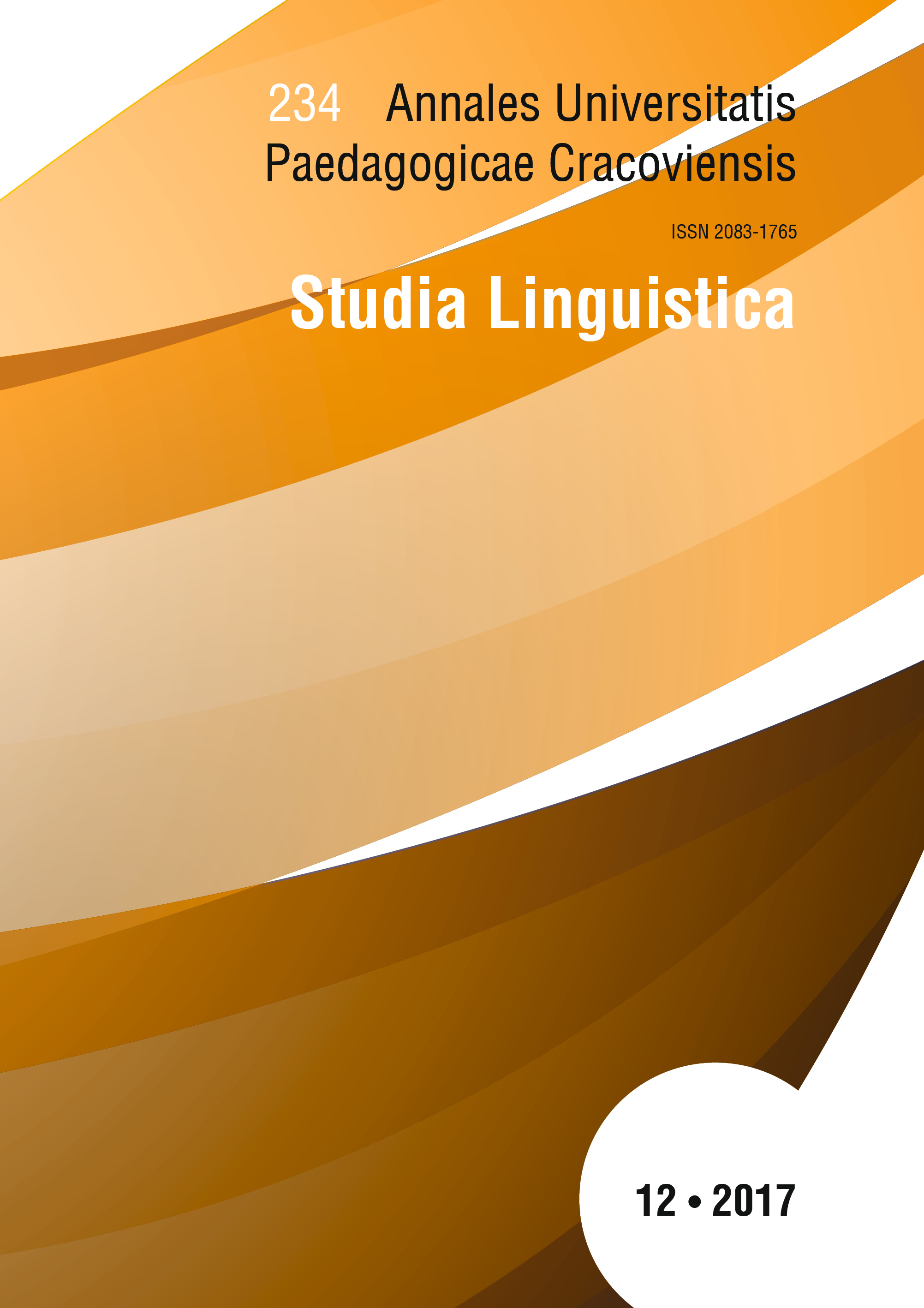Germanizmy w języku białoruskim mające polskie ekwiwalenty: ich liczebność w ujęciu diachronicznym i charakterystyka jakościowa 1
Main Article Content
Abstrakt
In Belarusian, different types of German loans are found. However, most of them did not come directly from German, but were passed on to Belarusian by other languages such as Polish, or later in history, Russian. In many cases, the path is unclear, especially with German loans found in all three Slavic languages mentioned. Apart from this, some of the (alleged) Germanisms are already loans in German itself, and hence could have taken different ways into Belarusian. This paper criticises older studies which comment on quantitative aspects of German loans in Belarusian, neglecting the “etymological” heterogeneity of the elements. Instead, an (approximate) quantitative analysis of German loans in Belarusian is offered, concentrating on those elements with Germanic etymology most probably mediated by Polish, the undoubtedly largest subset of Germanisms in Belarusian.
Downloads
Article Details
Autor, zgłaszając tekst do redakcji czasopisma „Annales Universitatis Paedagogicae Cracoviensis. Studia Linguistica”, zaświadcza, iż jest on rezultatem wyłącznie jego własnej twórczości, że treść artykułu nie była dotychczas publikowana oraz że utwór nie narusza w żadnym stopniu praw autorskich ani praw pokrewnych innych osób, jak również innych praw osób trzecich, a także, że niczyje prawa do utworu (lub jego jakiejkolwiek części) nie zostały pominięte. Po podpisaniu umowy prawa majątkowe do opublikowanych materiałów zostają przeniesione na Wydawnictwo Naukowe Uniwersytetu Komisji Edukacji Narodowej w Krakowie.
Rocznik „Annales Universitatis Paedagogicae Cracoviensis. Studia Linguistica” to czasopismo o otwartym dostępie, a cała jego zawartość jest udostępniana bezpłatnie dla użytkowników i instytucji na zasadach licencji Creative Commons CC-BY-NC-ND 4.0 (uznanie autorstwa, użycie niekomercyjne, bez utworów zależnych). Na podstawie tej licencji autorzy zgadzają się, że ich prace mogą być zgodnie z prawem ponownie wykorzystywane do jakichkolwiek celów, za wyjątkiem celów komercyjnych, bez konieczności uzyskania uprzedniej zgody ze strony autora lub wydawcy. Każdy może prace te czytać, pobierać, kopiować, drukować, rozpowszechniać oraz przetwarzać, pod warunkiem poprawnego oznaczenia autorstwa oraz oryginalnego miejsca publikacji. Publikowanych tekstów nie można wykorzystywać do tworzenia utworów zależnych (np. do tłumaczenia ich i publikowania w innym języku bez zgody wydawcy). Jest to zgodne z definicją otwartego dostępu BOAI (Budapest Open Access Initiative) „Studia Linguistica”nie pobiera opłat za składanie artykułów ani ich przetwarzanie.
Autor, przesyłając artykuł do redakcji „Studia Linguistica”, bezwględnie zgadza się z poniższymi punktami:
-
Oświadczam, że jestem Autorem lub Współautorem nadesłanego tekstu. Przesłany tekst nie był nigdzie publikowany, jest całkowicie oryginalny i nie narusza w żadnym stopniu praw autorskich ani praw pokrewnych innych osób, jak również innych praw osób trzecich, a także, że niczyje prawa do utworu nie zostały pominięte.
-
Oświadczam, że nadesłany tekst nie został złożony do recenzji lub/i publikacji w innym czasopiśmie.
-
Przyjmuję do wiadomości, że Autor ponosi pełną odpowiedzialność za każdy przypadek plagiatu, niezależnie od tego, czy został on wykryty podczas procesu recenzji, czy po publikacji w „Studia Linguistica”.
-
Oświadczam, że ponoszę pełną odpowiedzialność finansową i prawną za wszelkie roszczenia związane z utworem.
-
Potwierdzam uznanie wszystkich źródeł danych wykorzystanych i cytowanych w badaniach.
-
Potwierdzam, że artykuł został wykonany z należytą starannością zgodnie ze standardami edytorskimi „Studia Linguistica”.
Bibliografia
Basaj M., Siatkowski J., 2006, Bohemizmy w języku polskim. Słownik, Warszawa.
Google Scholar
Bieder H., 1976, Zur Erforschung des deutschen Lehngutes im westrussischen Schrifttum des 14. bis 17. Jhs. [w:] Opuscula slavica et linguistica. Festschrift für Alexander V. Issatschenko, Hrsg. H.-D. Pohl, N. Salnikow, Klagenfurt, s. 73–87.
Google Scholar
Булыка А.М., 1970 Чэшская лексіка ў выданнях Ф. Скарыны, [w:] Весці Акадэміі навук БССР. Серыя грамадскiх навук, No 3, s. 123–131.
Google Scholar
Булыка А.М., 1972, Даўнія запазычанні беларускай мовы, Мiнск.
Google Scholar
Булыка А.М., 1980, Лексічныя запазычанні ў беларускай мове ХІV–XVIII стст., Miнск.
Google Scholar
Булыка А.М. 1990, Роля польскага ўплыву ў развіцці лексічнага складу беларускай мовы данацыянальнага перыяду, [w:] Беларуска-руска-польскае супастаўляльнае мовазнаўства. Матэрыялы Першай усесаюзнай навуковай канферэнцыі (17–19 ліпеня 1990 г., Віцебск), рэд. Л.М. Вардамацкі, Віцебск, s. 3–11.
Google Scholar
Булыка А.М., 1993, Слоўнік іншамоўных слоў, Мінск.
Google Scholar
Галай В.М., 2006, Храналагічная класіфікацыя нямецкіх запазычанняў // Пісьменнік – Мова – Стыль: Матэрыялы ІІІ Міжнароднай навуковай канферэнцыі (Мінск, 29–30 верасня 2005 г.), рэд. М.Р. Прыгодзіч, М.І. Свістунова, Мінск, s. 165–166.
Google Scholar
Галай В.М., 2011, Адлюстраванне яўрэйскага культурнага ўплыву ў беларускай мове, [w:] Роднае слова, No 4, s. 56–58.
Google Scholar
Hentschel G., 2009, Intensität und Extensität deutsch-polnischer Sprachkontakte von den mittelalterlichen Anfängen bis ins 20. Jahrhundert am Beispiel deutscher Lehnwörter im Polnischen, [w:] Unsere sprachlichen Nachbarn in Europa. Die Kontaktbeziehun- gen zwischen Deutsch und seinen Grenznachbarn. (Diversitas Linguarum), Hrsg. Christel Stolz. Bochum, s. 155–171.
Google Scholar
Крукоўскі Н.І., 1958, Рускі лексічны ўплыў на сучасную беларускую літаратурную мову, Мінск.
Google Scholar
Прыгодзіч А.А., 2008, Лексіка нямецкага паходжання ў „Слоўніку беларускай мовы“ І.І. Насовіча, [w:] Спадчына Івана Насовіча і беларускае мовазнаўства. Mатэрыялы навуковых чытанняў, прысвечаных 220-годдзю з дня нараджэння Івана Іванавіча Насовіча (18 лютага 2008 года, г. Мінск), рэд. М.Р. Прыгодзіч, Мінск, s. 58–59.
Google Scholar
Wojan K., 2010, Przypadkowe i nieprzypadkowe wędrówki leksemów, Gdańsk.
Google Scholar
